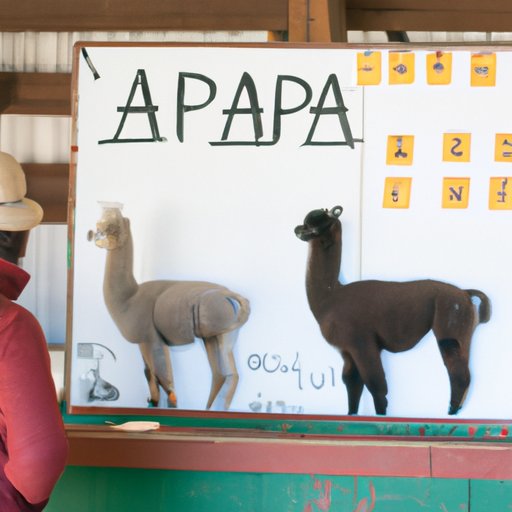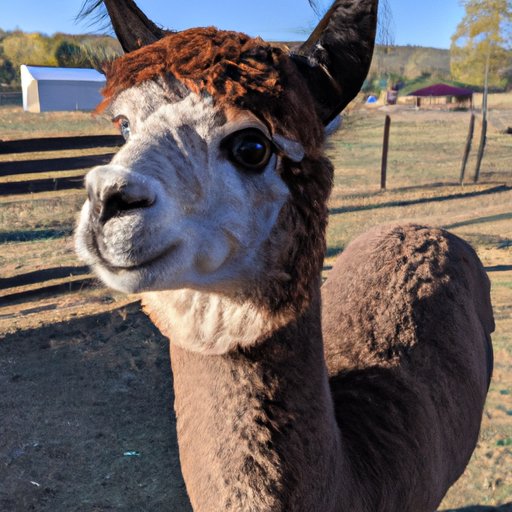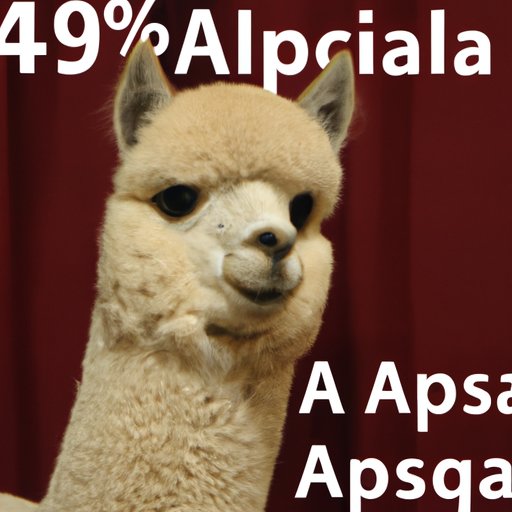Introduction
Alpacas are lovable, furry animals that have become increasingly popular as both pets and livestock in recent years. But before you dive into alpaca ownership, you may be wondering how much does an alpaca cost? This article will provide an overview of the costs associated with owning an alpaca, including purchasing, breeding, and farming.

Analyzing the Average Price of Alpacas
The cost of an alpaca will vary depending on the type, age, gender, and quality of the animal. According to the Alpaca Owners Association, the average price of a pet alpaca is between $1,000 and $3,000, while a show quality alpaca can cost upwards of $25,000. The most expensive alpaca ever sold was a white female named MFI Peruvian Macarena, who sold for $147,000 at the National Show in 2019.
There are two main types of alpacas: Huacaya and Suri. Huacayas are the most common type of alpaca and have thick, crimpy fiber. They typically cost between $2,000 and $4,000. Suri alpacas have long, silky locks and tend to be more expensive, with prices ranging from $4,000 to $10,000 or more.
Breeding Alpacas: The Cost Breakdown
If you plan to breed alpacas, there are a number of upfront and ongoing costs associated with doing so. You’ll need to purchase a starter herd of alpacas, which can range from $2,000 to $15,000 or more depending on the quality of the animals. You’ll also need to factor in the cost of feed, fencing, veterinary care, and other supplies. Ongoing costs include cria (baby alpaca) care and regular shearing. According to research by Purdue University, the average cost of breeding alpacas is approximately $7,500 per year.
However, there are several benefits to owning a breeding herd. Not only do you get to enjoy the companionship of these gentle creatures, but you can also earn income from selling crias or fiber products made from the alpaca’s fur. In addition, you can take advantage of tax deductions related to alpaca breeding.
How Much to Budget for an Alpaca?
When budgeting for an alpaca, it’s important to consider both the initial purchase cost and the ongoing costs of ownership. The initial purchase cost of an alpaca can range from $1,000 to $25,000 or more, depending on the quality of the animal. Additionally, you’ll need to factor in ongoing costs such as food, bedding, veterinary care, and shearing.
According to the Alpaca Owners Association, the average cost of owning an alpaca is approximately $500 per year. This includes food, bedding, vaccinations, worming, and general maintenance. Shearing fees can add up quickly, so it’s important to factor this into your budget as well.
Alpaca Farming: What Does It Cost?
If you’re interested in starting an alpaca farm, there are a number of start-up costs associated with doing so. These include purchasing land, building pens and shelters, and buying a starter herd. Depending on the size of the farm, these costs can range from a few thousand dollars to tens of thousands of dollars. Additionally, you’ll need to factor in ongoing costs such as feed, veterinary care, and labor.
According to research by the University of Minnesota, the average cost of starting an alpaca farm is approximately $35,000. This includes the cost of purchasing land, building pens and shelters, and buying a starter herd. The average ongoing cost of running an alpaca farm is approximately $8,000 per year.

Factors That Influence Alpaca Pricing
When shopping for an alpaca, there are a number of factors that can influence the price. The quality of the alpaca is one of the most important factors. Show quality alpacas tend to be more expensive than pet quality alpacas. Additionally, the age of the alpaca can affect the price. Older alpacas tend to cost less than younger ones.
The breed type and gender of the alpaca can also influence pricing. For example, Suri alpacas tend to be more expensive than Huacaya alpacas. Male alpacas (males) are typically more expensive than female alpacas (females). However, it’s important to note that males can be more difficult to handle and require additional care.

Where to Buy an Alpaca on a Budget
If you’re looking for an alpaca on a budget, there are a few options available. One option is to research reputable breeders who specialize in pet quality alpacas. Many breeders offer payment plans or financing options, making it easier to buy an alpaca on a budget. Additionally, you can check local auctions for alpacas that may be priced lower than those offered by breeders.
Financing Options for Buying an Alpaca
If you don’t have the cash on hand to buy an alpaca, there are financing options available. Many reputable breeders offer payment plans or financing options to make it easier to purchase an alpaca. Additionally, some banks offer loans specifically for alpaca purchases. It’s important to shop around and compare interest rates and terms to find the best loan for your needs.
Conclusion
Adding an alpaca to your family can be a rewarding experience. Before you make the decision to purchase, it’s important to understand the cost of owning an alpaca. The cost of an alpaca can range from $1,000 to $25,000 or more, depending on the quality, age, breed type, and gender of the animal. Additionally, there are upfront and ongoing costs associated with breeding and farming alpacas. When budgeting for an alpaca, it’s important to factor in the initial purchase cost and ongoing costs of ownership. Lastly, there are financing options available if you don’t have the cash on hand to purchase an alpaca.
(Note: Is this article not meeting your expectations? Do you have knowledge or insights to share? Unlock new opportunities and expand your reach by joining our authors team. Click Registration to join us and share your expertise with our readers.)
